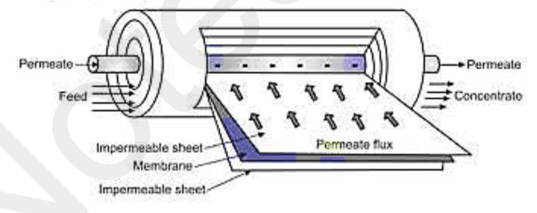Table of Contents
MEMBRANE Filter
Principle of membrane filter
- Membrane filter consists of microsporous plastics films of specific pore sizes, therefore it is also known as screen, sieve or microsporous filter.
- Membrane present in these filters retains particles or microorganism (larger than the pore size) by surface capture.
- It act like sieve and the particulate matter is retained on the surface of membrane.
Construction of membrane filter
- Membrane filter consists of membrane of cellulose acetate, cellulose nitrate in mixed cellulose ester.
- The pores size of filter in micron or submicron range.
- A membrane filter is 150µm thick and contains about millions of microscopic pores. The diameter of these spores is uniform. Based on the requirement the size of these pores is adjusted, during the process of polymerization.
- The most widely accepted membrane filter possesses a pore size of 0.22µm and 0.45µm.

Working of Membrane Filter
- The membrane filter functions like a sieve and thus removes particle.
- The filter of 0.010- 0.10 µ pore sizes remove even viruses from water or air and filter of 0.30 – 0.65 µ pore sizes remove bacteria.
- Filter with largest pore sizes is used in aerosol radioactivity and particle sizing applications.
- For sterile filtration, the membrane is autoclaved in the holder and to prevent curling they are packed between thick filters. Some membrane filters which are pre-sterilized (by ethylene oxide or ionizing radiation) are also available.
- A rigid base of perforated metal, plastic, or coarse sintered glass is used to support the membrane filter during filtration process (as in the case of fibrous pad filters).
Uses/Applications of Membrane Filter
- It is used for sterilization and clarifying aqueous and organic solvents including buffers, microbiological and tissue culture solution.
- It is suitable for filtration of enzyme solution.
- It is used for diagnostic cytology and receptor binding studies.
Advantages of Membrane Filter
- It does not allow any cross contamination.
- Its filtration rate is rapidly.
- It can be easily disposed off
- Since absorption is negligible, it does not import any fibres or alkali into the filtrate.
Disadvantages of Membrane Filter
- It may get clogged
- It ordinary, it is less resistant to solvents like chloroform.
